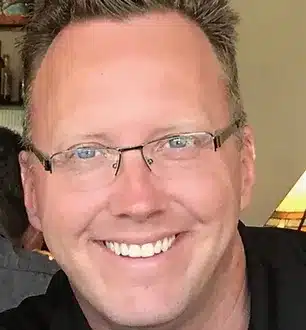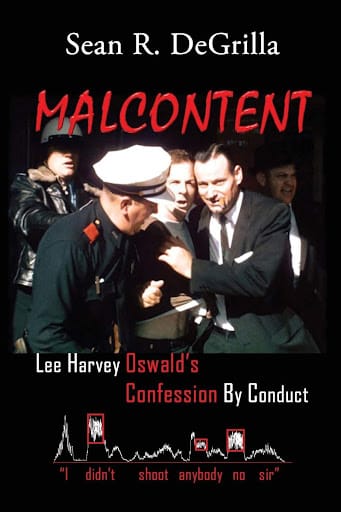Rounding out our month of True Crime this November, we have an Interview with Sean R. DeGrilla; Author of Malcontent: Lee Harvey Oswald’s Confession by Conduct. Sean R. DeGrilla is a seventeen-year veteran of law enforcement, a Medal of Valor recipient, and has provided material support to the FBI, MBI, Gang Unit, and various local, state, and Federal agencies. He has since transitioned to the private sector where he is a security manager for a medical company in Florida. More about Sean R. DeGrilla is at the bottom of this interview.

Can you share a little about what got you interested in Lee Harvey Oswald?
I moved to Dallas in 1983 when I was ten years old. We were having lunch on top of the Reunion Tower, the building in downtown Dallas that has the iconic “ball” on top. My dad pointed down to Dealey Plaza and said “that’s where President Kennedy was shot. Some say he was shot from that building; others say from someone else behind that fence.” The bug bit me.
What was the most challenging part about the research you’ve done for Malcontent?
The most challenging part of research is that it is so daunting. 27 official volumes. Millions of documents. And decades of misinformation and disinformation that had to be traversed. And just as many minds and opinions to try and convert.
And with that comes a certain amount of responsibility. There have been collectively thousands of books and articles written about the assassination. What else can someone say? Well, in Malcontent: Lee Harvey Oswald’s Confession by Conduct, I found something new. Hiding in plain sight, actually. When I was going through the application process in law enforcement, I took a CVSA-Computer Voice Stress Analysis. In the simplest of terms, what this instrument does is measure the stress in your voice. Think of your voice as an AM/FM radio. The AM portion of your voice is the audible version. The FM portion is the inaudible, uncontrollable part of your voice that changes based upon stressors. This is what the CVSA measures: the absence of the FM part of your voice. I then wondered if this could be used posthumously and contacted the number one expert in CVSA. He said it had never been tried before but that he would give it a shot. I sent him eleven audio clips of Oswald. Some of him telling the truth. Some telling lies. Some telling truth and lies in the same breath. The results from the almost sixty year old sound bites were all spot-on. Lee Harvey Oswald had taken a lie detector test and never even knew it. And he dimed himself out.
What is something you wish had been done differently from the start of the writing? And what if anything would you have done differently?
As far as the book is concerned, I would have taken more time writing. With your first book you just want to hurry and see it in print. To hold it in your hands. To feel the rush of satisfaction of being in print for the first time. It can be quite intoxicating, but it is a mirage.
What challenges did you face when you first started writing, and how did you overcome them?
When I first tried to write this book, I was having the most dreadful time. Like a nerd, I googled “how to write a book”. From there I learned to write just 1000 words a day. That’s nothing. That’s a love letter. And before you know it, you have pages and pages of thoughts. The challenge is to organize them. I also read and listened to Stephen King’s On Writing, about how he started his writing journey. Very inspiring and so down to earth. I recommend that book to anyone starting on their writing journey. It will be time well spent.
Can you describe your typical writing routine? Do you have any specific habits or rituals that aid your creative process?
My writing routine is very simple: I must be writing at my desk. Not at the pool. Not at a baseball game. But at my desk surrounded by my books. I admire those that can write anywhere. But I did all my writing at my desk. There’s something visceral being surrounded by books that made me feel like writing.
What role does research play in your writing? How do you strike a balance between authenticity and creative freedom?
A book like this takes a vast amount of research. There’s just so much out there. Not to mention the National Archives and online resources. Many first-generation JFK assassination books are becoming scarce or financially out of reach. That’s where your trusted network of friends comes in. I must say that I have had just as equal success with the knowledge and expertise of like-minded friends than I have had with official databases.
Can you share your journey to becoming an author? What inspired you to pursue a writing career?
I must admit that my inspiration for writing, at least a part of it, was pure selfishness. To see your name on the spine of your book. Your thoughts finally in physical form. To have created something that will outlast you. But then that evolved into telling the story the way I see it. And hopefully being able to be a part of the process that sets the historical record straight. Because in the final analysis, the truth must be told. Writing is the only way I know how to do that.
What do you find to be the most challenging aspect of being an author, and how do you navigate those challenges?
One of the most challenging things about being an author is the criticism. I would rather swallow glass than get one more piece of hate mail from those saying I am a “CIA shill” or that I am on the government payroll. Haven’t received one check yet…
What do you hope your literary legacy will be? How would you like to be remembered as an author?
I hope my legacy will be that I told the truth. That in the sea of naysayers and those advancing their own private interests, that books like mine expose Lee Harvey Oswald for the sole murderer he was. Conspiracy folks try and take credit away from him. But that’s not what he wanted. He wanted to kill to advance his own name. He wanted to do it. Brutally murdering a man in front of his wife. Killing a police officer and leaving him dead in the street for others to find him. And robbing a generation of their innocence and security.
Are there any exciting projects or new directions you’re planning to explore in your upcoming works?
I am currently working on my second book, Communistic Tendencies: The Collected Works of Lee Harvey Oswald. Everything that he put pen to paper. I have also identified where exactly Oswald did his own writing, specifically his manifestos that he wrote on Neely Street. And using a new technique, have recovered some handwriting from four missing pages of his address book, putting to rest two conspiracy theories.
About Sean R. DeGrilla

“I am a seventeen-year veteran of law enforcement, a Medal of Valor recipient, and have provided material support to the FBI, MBI, Gang Unit and various local, state and Federal agencies. I transitioned to the private sector where I am a security manager for a medical company in Florida.
I possess a B.A. in History and am a member of Alpha Sigma Lambda Honors Society.
Growing up in Dallas, I had a life-long interest in the Kennedy assassination. One of my many personal goals has been to write a scholarly book concerning the events of the assassination. In June of 2019 that goal was realized with the publication of my first book, “Malcontent: Lee Harvey Oswald’s Confession By Conduct”.
I have dedicated my life to, and have a passion for, inclusive safety and security implementation. I specialize in mitigating hazards, procuring safety and security, and reducing liability by relying on my substantial law enforcement training and experience.
My other passion is writing. My first book is a law enforcement investigative analysis of Lee Harvey Oswald’s idiosyncratic criminal behavior via the spectrum of consciousness of guilt, including a history-changing (and first-ever) Computer Voice Stress Analysis of Oswald. I am currently working on my second volume, a reference work containing all of Oswald’s known collected writings and the impact of those writings upon history.”
For more information, please visit: https://www.seandegrilla.com/
About Malcontent Lee Harvey Oswald’s Confession by Conduct by Sean R. DeGrilla
*Affiliate links are used in this article. The Mystery Review Crew is an Amazon Affiliate and, as such, earns from qualifying purchases. See our privacy policy and disclosures for more information.

“To understand the Kennedy assassination, it is imperative to first understand Lee Harvey Oswald. The man—who on November 22, 1963—brought a nation to its knees. This book takes the investigation of Oswald’s actions and words surrounding the deaths of a President and a police officer in a radically new direction. A law enforcement analysis as seen through the spectrum of Consciousness of Guilt is coupled with the first-ever Computer Voice Stress Analysis of Lee Harvey Oswald.
The personal assassination notes of the Dallas Homicide Detective at the heart of the investigation and handcuffed to Oswald during that fateful shooting are published here for the first time.
Published for the first time, the writings of Michael Paine explores his unique knowledge and political conversations with Oswald. This book sheds new light on a controversy that has raged for over 50 years.
Was Lee Harvey Oswald guilty or a self-proclaimed patsy?”
*Affiliate Links Used
Find it on Goodreads, Amazon, and Bookshop.org
See Anita Dickason’s article on the events that transpired Nov 22nd, 1963. A Day Never Forgotten: The Killing of an American President.






I know Sean from our law enforcement roots and days. I know his dedication and his abilities. I’m anxious to read his book.